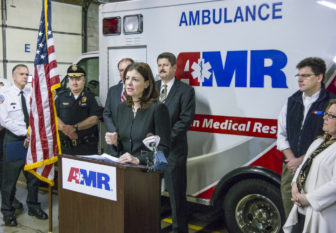
NASHUA, NH – U.S. Sen. Kelly Ayotte announced her support of legislation that would exempt first responders – including trained family members – from liability for administering medications like naloxone, that reverse the effects of a heroin overdose.
Ayotte supports the Opioid Overdose Reduction Act of 2015, bipartisan legislation introduced by Ayotte along with colleagues Sen. Edward J. Markey, D-Mass, and Tim Kaine, D-VA.
Ayotte was in Nashua on Thursday to promote the legislation, which would protect first responders, health professionals and family members trained in administering and drugs like Narcan in an emergency heroin overdose.
The bill would remove the fear of liability in situations where there might currently be hesitation – situation that quickly become life and death moments, where there is hesitation.
The proposed bill has the support of American Medical Response (AMR), the nation’s largest ambulance provider, and the American Ambulance Association (AAA), who were on hand for a news conference with Ayotte in Nashua on Thursday.
“As we are all unfortunately aware, substance misuse is a problem across the country, and right now New Hampshire is facing prescription opioid abuse and heroin epidemics,” said Tom McEntee, CEO East Region for AMR.
Senator Ayotte welcomed support from AMR and the American Ambulance Association.
“I helped introduce the Opioid Overdose Reduction Act to provide liability protections to first responders, health professionals and family members who are educated in administering and steps to be taken after administering naloxone in an emergency situation of overdose,” Ayotte said. “This bill will help address liability concerns that may make some hesitant to administer a lifesaving drug to an individual who has overdosed on heroin or prescription drugs. The alarming rise in overdose deaths in New Hampshire requires swift action, and this common sense legislation will help save lives.”
The Opioid Overdose Reduction Act would address this problem by exempting the following groups from civil liability:
- Individuals who work or volunteer at an opioid overdose program from any harm caused by the emergency administration of an opioid overdose drug that they provide as a part of an opioid overdose program;
- Health care professionals from any harm caused by the emergency administration of an opioid overdose drug that they prescribe or provide to any person provided that person receives education in the proper administration of the opioid overdose drug and steps to be taken after administration of the drug;
- Individuals, including first responders, who administer an opioid overdose drug to a person who is or reasonably appears to have suffered an overdose provided they either are doing so pursuant to a prescription or they obtained the overdose drug from an overdose program or a healthcare professional and received education in the proper administration of the overdose drug, including steps to be taken after administration of the drug.
- “First responders, whether they are EMS, police and fire, or family, are serving on the front lines of unprecedented heroin and prescription drug crises. They shouldn’t have to hesitate, especially in moment that could mean life or death, to worry about a potential lawsuit,” said Steve Murphy, senior vice president of government and national services for Envision Healthcare, AMR’s parent company.
“It’s very important to our organization that first responders have the tools that they need to save lives in case of an opioid overdose and feel that they are able to use the means necessary without fear of prosecution, and that’s why we are pleased to endorse Senator Ayotte’s bill today,”said Chris Stawasz, general manager for AMR in New Hampshire and Maine.
Between 2000 and 2013, the death rate from heroin overdoses nationwide nearly quadrupled. In 2014, New Hampshire saw 300 deaths attributed to drug overdoses, but the death toll could have been much worse were it not for naloxone which quickly reverses the effects of opioids, including heroin and most prescription painkillers.
- The Opioid Overdose Reduction Act has also been endorsed by:
- Trust for America’s Health (TFAH)
- American Psychiatric Association
- Association of State and Territorial Health Officials
- Community Anti-Drug Coalitions of America (CADCA)
- American Society of Addiction Medicine
- Drug Policy Alliance, Harm Reduction Coalition
- New Hampshire Association of Chiefs of Police
- Massachusetts Organization for Addiction Recovery (MOAR)
- Learn to Cope
- Association of Behavioral Healthcare
- Massachusetts Sheriff’s Association
- Massachusetts Association of Behavioral Health Systems.
 You’re one click away! Sign up for our free eNewsletter and never miss another thing
You’re one click away! Sign up for our free eNewsletter and never miss another thing







